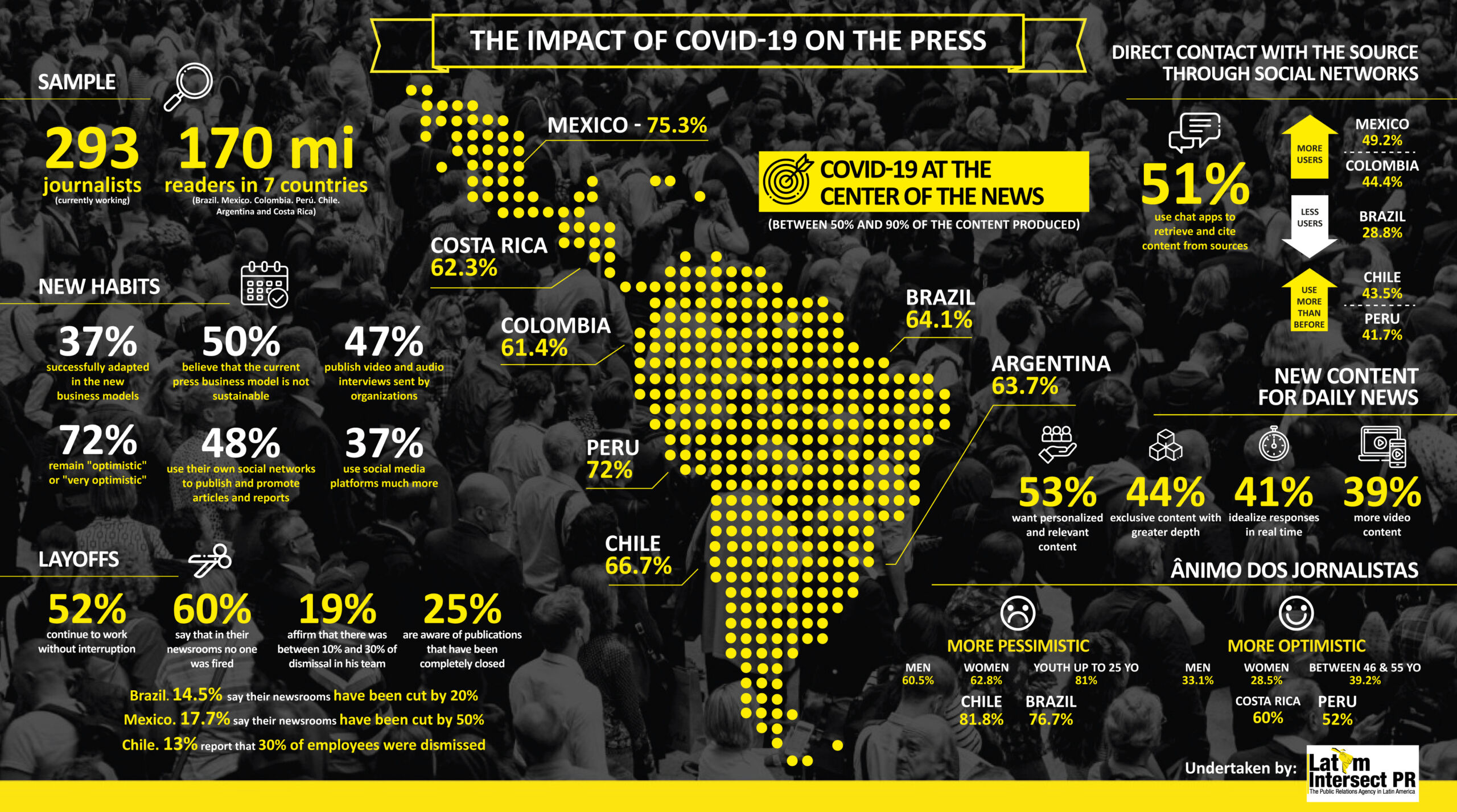Research Across Latin America’s Journalist Community Highlights Resilience in the Face of Pandemic.
Social confinement and other restrictions imposed by the COVID-19 pandemic have also forced journalists and publications across Latin America to adapt their working proccess. As a result, new relationships and working practices are developing between organisations, spokespeople, public relations agencies and publications themselves.
According new research developed by our regional PR specialists, LatAm Intersect PR, over half Latin American journalists (52%) have managed to continue operating ‘without interruption’ during the COVID-19 pandemic and subsequent confinements across the region, while 60% publications have yet to make any redundancies and 37% have successfully adapted their business models to the new commercial realities.
The research reveals an evolution in the manner in which journalists are now sourcing and verifying content: 22% are tracking and citing quotes direct from spokespeople’s social media feeds, while a similar proportion are publishing responses and comments sent by spokespeople in real time; nearly half (47%) are publishing pre-recorded video or audio interviews sent by organisations wishing to contribute to a story, and 51% are using chat applications to source and cite content from sources.
It also sheds light on the state of mind of the region’s media professionals. 72% remain ‘optimistic’ or ‘very optimistic’ about the future of their profession, 71% have increased presence via their publications’ social media handles and nearly half (48%) are leveraging their own, personal social media handles to publish and promote their work.
LatAm Intersect PR’s research was conducted across 293 (currently working) journalists, by email questionnaire, between July 10 and 15, with a collective readership of potentially over 170 million across Brazil, México, Colombia, Peru, Chile, Argentina and Costa Rica, and designed to track the resilience and evolution of the sector during this period of pandemic.
According to Claudia Daré, Founder and Managing Partner of LatAm Intersect PR, the research reveals definitive shifts in working practices and business models that organisations engaging with the media in the region should take into consideration.
“Since the emergence of COVID-19, 37% of journalist respondents are now using social media platforms more than previously, while a similar proportion consider such platforms as their ‘principle source of contact’ with spokespeople and company sources. Such shifts change the dynamic between the media, the communications department and the spokespeople; this use of social media is facilitating a more direct relationship between journalists and information sources. Such developments are not merely inevitable, but positive in terms of transparency and speed of response; however, communications departments and their agencies need to adapt their policies and practices accordingly,” said Claudia.
According to the research, one of the principles shifts resulting from the imposition of confinement measures, is the emergence of home working for journalists, and manner in which they are connecting with company spokespeople. Certain countries are adopting more ‘informal’ ways of connecting with information sources, with social media now representing a principle channel. Nearly half journalist respondents from Mexico (49.2%), for instance, regularly sourcing and citing content from social media feeds, followed by Colombia (44.8%); a practice currently adopted by only 28.8% of Brazilian media.
Journalists from Chile (43.5%) and Peru (41.7%) affirm that they are now using social media sources more frequently than prior to the pandemic.
The research did, however, reveal areas of concern and caution; 50% of respondents acknowledge that their current business model is not sustainable over the long term, and that alternative revenue sources will need to be found. Nearly one fifth (19%) have already laid off between 10% and 30% of their staff, and a quarter (25%) are aware of publications that have closed down completely as a result of the virus.
Amongst Brazilian journalists surveyed, 14.5% have seen staff reductions of up to 20%, while in Chile 13% estimate that up to 30% of professionals have been made redundant, while 17.7% Mexican journalists affirm to have seen their staffing levels reduced by half.
According to the research, currently, over half (51%) of publications remain focused on COVID-19-related stories (contributing up to 70% of their content), but this situation is certain to evolve. In Mexico, 21.3% respondents suggest that 90% of news stories are driven by COVID-19-related content, while a quarter of Peruvian journalists (24%) claim that pandemic-related stories account for 80% of the local news cycle. Overall the journalists all over Latin America is focused between 50% and 90% in the subject.
Claudia explains that the findings also provide a valuable insight into how organisations looking to communicate through the media can themselves adapt to support the sector and communicate their messages more effectively.
“Now, more than ever, organisations need to be thinking beyond the press release; rich media (including videos), (near) real time content, and specific responses to issues of the moment are some of the techniques which will enable journalists to generate content of quality and distinction,” she says.
Key journalist requirements to prosper in the ‘new normal’ include:
- 53% are looking for personalised content; relevant and tailored to their publication
- 44% need ‘genuinely exclusive’ content
- 44% are looking for a deeper insight or angle on the day’s news
- 41% would ideally like ‘(near) real time responses to the issues of the day’
- 39% are looking for more video content to support their reporting
- 24% require more background briefings to provide context to stories
“The survival and prosperity of a dynamic, independent media is essential for businesses and organisations who want to communicate; today, journalists are looking for new forms of content and collaboration to assure the same. We believe that communicators – in house and agency-side – have a vital role to play in this evolution,” adds Claudia.
The survey was completed with an open question to the region’s journalists on which word(s) they would use to best describe the pandemic and resulting impact on their respective countries. In this respect, respondents from Chile proved the most pessimistic: 81.9% citing negative words and expressions, followed by Brazil (76.7%) and Mexico (68.9%) recording similar sentiments. Respondents from Costa Rica (60%) and Peru (52%) demonstrated more optimism.
Male and female respondents demonstrated identical levels of pessimism (around 60%), while more slightly more men processed to be optimistic (33.1%) compared to women (28.5%).
Younger respondents (aged 25 or below) proved to be the post negatively disposed as a result of the pandemic with 81% registering negative sentiments.
Negative words appearing with most frequency in the research open questions were: ‘chaos’, ‘uncertainty’, ‘crisis’, ‘inequality’, ‘disaster’, ‘devastation’, and ‘catastrophe’. Most popular more positive terms included: ‘resilience’, ‘resistance’, ‘hope’, ‘adaptation’, ‘opportunities’ and ‘survival’.
“The research demonstrates how the regional media are adapting to the situation. In general, the findings are fairly consistent between countries, indicating the profound impact the pandemic is exerting across all media in the region,” adds Claudia.
LatAm Intersect PR is a public relations firm specializing in corporate and consumer campaigns for clients across the Latin American region. Their fundamental belief: in a world of big data and automation, the ability to connect with people, to inform and persuade them of a particular point of view through relationships, evidence and discussion is more important to businesses than ever.
Headquartered in Sao Paulo, Brazil, the firm has offices in México, Colombia, Peru, Chile, Argentina and Costa Rica (for central America).





